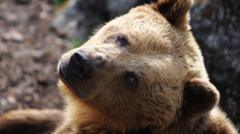In a surprising development, Slovakia's government has approved plans to sell brown bear meat, a decision that has sparked significant debate regarding wildlife conservation and public safety. The move follows a government decision to shoot a significant portion of the approximately 1,300 brown bears in the country, citing a rise in human-wildlife encounters, including fatal incidents.
The decision to cull up to 350 bears was spurred by recent attacks, notably a high-profile case where a man was killed in a forest in Central Slovakia. Prime Minister Robert Fico stressed the necessity of the cull, commenting: "We can't live in a country where people are afraid to go into the woods." He argues that an overpopulation of bears has led to increased risks for the public.
However, the plan has drawn sharp criticism from environmental organizations and political opposition, both of which highlight the brown bear's designation as a "near threatened" species under EU law. Michal Wiezik, a vocal ecologist and member of the European Parliament from the opposition party Progressive Slovakia, described the government's actions as "absurd," contending that the increased number of encounters often occurs without incidents, and that the focus should be on preventing bear attacks rather than culling.
Miroslava Abelova from Greenpeace Slovakia has condemned the government's culling proposal as "reckless," asserting that it goes against conservation laws and scientific guidelines. The European Union strictly protects brown bears, allowing their killing only in extreme situations where public safety is at risk.
Starting next week, the Slovak Environment Ministry will open a channel for organizations to sell the culled bear meat, provided they meet specific legal and health regulations. Minister Filip Kuffa defended the measure, arguing against the wastefulness of disposing of the animal carcasses, emphasizing the consumption potential of bear meat.
Bear meat is considered a delicacy in limited areas of Europe, particularly in certain regions of the East and the Nordic countries, but is not commonly found in restaurants across the EU. Health officials caution against the risks associated with consuming bear meat, particularly concerning the parasite Trichinella, for which EU regulations mandate testing before any bear meat can be sold. Given its strict hunting regulations and conservation status, it remains a rare commodity.
This controversial culling and subsequent market plan have raised questions about the balance between human safety and wildlife conservation, as Slovakia navigates increasing tensions surrounding its bear population.


















